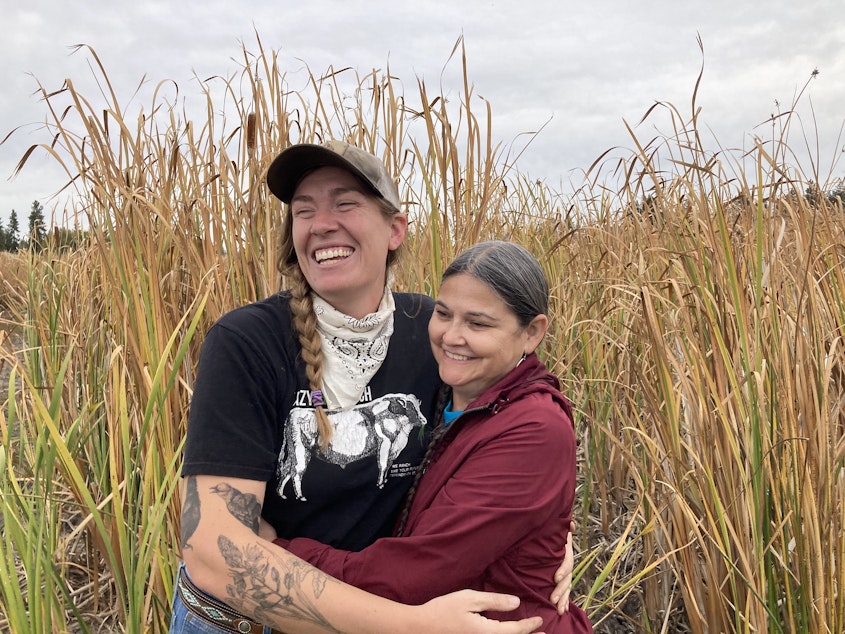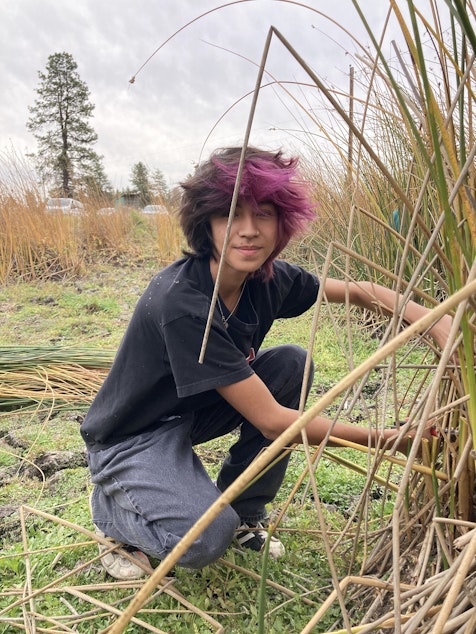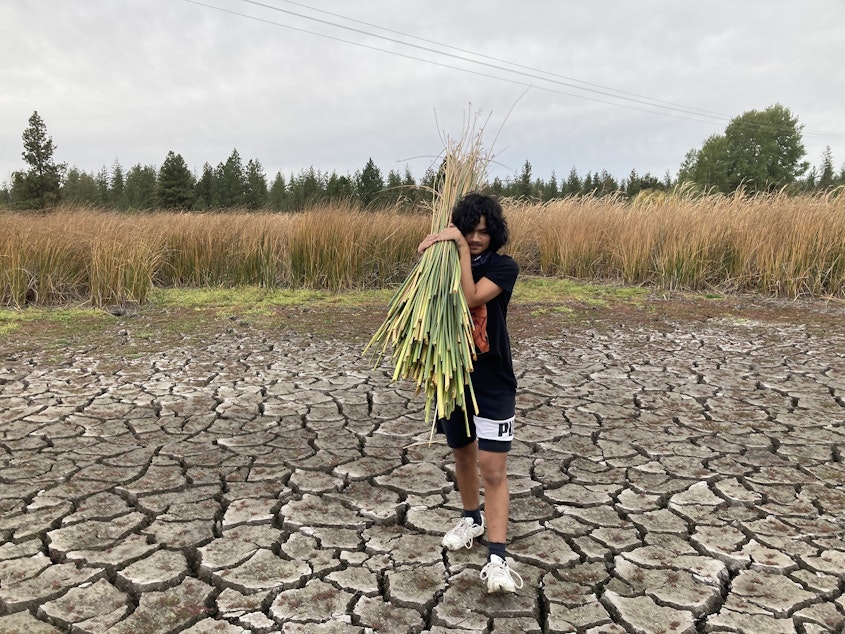This rancher believes her land was stolen from Native Americans. She’s making amends

The following story comes from Women’s Work, a new podcast from environment reporter Ashley Ahearn that explores how women ranchers across the West are changing how we raise meat. Listen to Women’s Work wherever you get your podcasts and at NPR.
B
eth Robinette doesn’t care what the good ’ol boys at the local coffee shop say about her.
“In cowboy boots, I'm 6 feet tall, and I'm covered in tattoos,” she says. “I got hairy armpits. And my husband cross-dresses as a lady on the weekends. I'm so beyond giving a shit.”
Robinette owns and runs the Lazy R Ranch about half an hour outside of Spokane, Washington.
The ranch has been in her family since the 1930s. Her great-grandfather ran a dairy farm here, which her grandfather and father switched to a beef operation. Beth returned to the ranch 10 years ago after finishing college, and she’s been learning about the landscape ever since — the plants, the seasonal patterns, the soil.
She has also learned about the history of this land, and the people from whom it was taken.
“I know the history of how I came to own it,” Beth says. “It wasn't because I went and put a gun up against somebody's head. But it was because somebody went and put a gun up against somebody’s head, and the goods are still ill gotten, and I'm still in possession of them.”
The vast majority of ranches across the West are owned by white people, taken from Native Americans by treaty and by genocide.
The road to healing and reconciliation is a long and slow one. But Beth has found a partner on that journey: LaRae Wiley, a member of the Colville Confederated Tribes and co-founder of the Salish School in Spokane. It’s a language-immersion school that helps young Native Americans reconnect with their culture.
RELATED: Seattle teen calls out her dad’s Native American art. He learns she’s right
LaRae Wiley is a small, energetic woman with twinkly eyes and thin black braids that hang down over each shoulder. She grew up a mile down the road from Beth’s ranch.
“When I was little, we'd ride our bikes down here and they had a donkey,” she recalls. She’d feed the donkey a carrot, then pedal home.
LaRae co-founded the Salish School more than a decade ago. There are 58 students enrolled this year, ranging from a 1-year-old baby to a sophomore in high school. The students and teachers there speak the Colville-Okanogan language. There are believed to be just four fluent speakers of that dialect of the Salish Language left in the U.S.
LaRae says a big part of connecting her students with their language and culture is getting them out on the land.
“That's part of bringing the language back,” she says. “So much of our learning was cut off because of the boarding schools and genocide … with our language coming back, then our other cultural pieces come back as well.”
Warren Seyler is a tribal historian and former council member of the Spokane Tribe of Indians. We met up at the Spokane Tribe Casino, about 15 miles from Beth’s ranch, in a conference room off the main gaming hall.
The Spokane Tribe and the confederated tribes of the Colville Reservation — LaRae’s people — inhabited the lands where Beth’s ranch is now. This casino sits on a historic spot.
“This site, and just west of here, is where we made our last stand,” Warren says. “In 1858, from this site, you would have seen a battle. You would have heard gunshots, cannon blasts war, cries.”
In that spring of 1858, the Spokane and other Nations had defeated the U.S. Army not far from here. But the U.S. troops came back that summer under Colonel George Wright, this time with a new rifle with a longer, more lethal range.
There were battles around the area where Beth Robinette’s ranch is now. Thousands of Native Americans died. When tribal leaders went to negotiate with Colonel Wright at his camp, he had them hanged.
“George Wright was coming to kill and to punish the Spokane Tribe and the Coeur D’Alenes and Yakama tribes, some Palouse, for defending our country,” Warren says.
Homesteaders poured into the Spokane Valley. The government wanted Native Americans off the land and onto nearby reservations. They wanted their farmlands, their fishing sites.
“They were wanting everything that provided for the Spokanes for thousands of years,” Warren says.
Under the Homestead Act of 1862, white settlement expanded rapidly. Native children were taken away to boarding schools, where they weren’t allowed to speak their languages; the Spokane Tribe was ultimately forced onto a reservation in 1881.
Warren tells me the first owners of Beth Robinette’s ranch may have claimed the land right out from under Native Americans who were living on it.
“At that time, Indians were not considered people,” he says. “That land probably began as some homesteaders putting a stick in the ground and claiming it as their own. It was that simple.”
Beth Robinette didn’t grow up knowing the same history LaRae Wiley did. When Beth was a kid, it wasn’t taught in school, and this isn’t what most ranchers get together and talk about.
Beth’s awareness about her ranch’s history is largely self-taught, a curiosity inspired by the Black Lives Matter movement.
“I was trying to do a lot of reflection on what all that meant to me,” Beth says. “Like, am I culpable in all of this? Or am I not? Or do I get a free pass?”
She’s reflected on her privilege.
“A big part of it is this piece of land,” she says.
Beth’s family was not the first white family to own this land, to put that stake in the ground, as Warren puts it, but she feels complicit.
“I'm very connected to this place, and I feel that there's hurt,” she says. “I'm very aware of my connection to that legacy. In whatever way I'm able, I'd like to make a play at some healing around that. If it's possible.”

T
hat’s where Beth got the idea to reach out to LaRae Wiley and the Salish School.
LaRae and Beth talked about the land and the history. They met in person. Eventually, they decided to bring students out to the ranch.
They started small — a group of kindergarteners came out and harvested wild roots in the spring. The kids really got into it, Beth says.
This fall, they brought teenagers out to the ranch to harvest tule — a type of bulrush with a long spongy stalk. LaRae explains to the students that her ancestors used the tule to insulate their teepees and lodges, and to keep out moisture. They’d also weave the long stalks into mats.
They were used to make mats for winter dances, to set food on.
“That's one of the things that I am trying to bring back is our winter dance and the mats,” LaRae says. “What these guys are going to be working on is making those mats.”
LaRae and the students make an offering of tobacco to the land in thanks for today’s harvest before splitting up and walking into the wetlands with clippers. I follow LaRae to a big patch of tules. She crouches at the base, clipping the long green stalks — they’re taller than she is — and lays them on the ground beside her.
LaRae says it meant a lot to her that Beth invited the students to the ranch. It can be nerve wracking taking students out to harvest plants and medicine, LaRae says. Native people are sometimes made to feel unwelcome, even on public land.
“Sometimes folks will kind of look at you strange, like what are you doing?” she says.
LaRae says she feels safe bringing her students here. Beth may not have all the right answers, but she’s reaching out, when many landowners aren’t.
“It was shocking to hear Beth say, as a white person, ‘I don't want to be a shitty white person; I want to give back,’” LaRae says. “And, ‘This land wasn't mine and my family's.’ Most people don't say that. And especially when it comes to land. The whole idea of ownership, you know, is so ingrained in American broader culture.”
It’s so different from how Native people saw land ownership, she says.
Ownership wasn’t a formal concept for her ancestors, LaRae says. It wasn’t about holding dominion or extracting value or having a legal document to prove that it belonged to you. The land was their mother. You did not own your mother. It was about working with the land, tending it, being a part of it.
“We knew where everything was. We maintained it using fire, we gathered accordingly, we left some so that there'd still be other places for it to grow,” she says. “We were managing the land. And that's really different than imposing what you need on the land.”
An Indigenous-led movement has taken hold in the past few years. It’s called the LandBack Campaign, and it’s about restoring political and economic control to Indigenous people in the U.S. and Canada over lands that once belonged to them.
Some tribes are buying back land that white settlers took from them. Some nonprofits are giving land back to tribes, or creating legal agreements that protect tribal rights to access land that’s culturally important to them.
Ranchers have not been a part of the LandBack movement in any significant way so far. That’s what drew me to Beth. She may not be signing her property over to the Spokane or Colville Tribes, but she’s offering what she can, and LaRae’s excited about it.
When I met with Warren Seyler at the Spokane Tribal Casino I told him about LaRae and what she and Beth are doing together. He has a lot of respect for LaRae’s efforts to keep the Salish language alive through the young people she’s teaching — and for her efforts to connect with Beth and her land.
“Some people might not see what a gift that is; it's more than just collecting tules,” he says. “It’s a growing and fulfilling experience for some of those youth. Because we look at the modern world today. So many youth are lost…
“For tribal people, it's understanding who they are, who they were, and how their ancestors lived. That knowledge helps fill some of those holes in those kids.”

And with that knowledge, Warren told me, can come strength. When tribal youth learn what their ancestors went through — what they survived — he says they often find power in that.
“They realize, no matter how hard they tried to do away with us, how many things they threw at us, from bullets, and cannon fire, to boarding schools, to trying to change the way we think about earth and the world … to eliminate our culture and our traditions, our ancestors, so strong, so resilient, they understand it's their turn, to take up that resiliency.”
Back at the ranch, a teenager named Kale picks tule. Kale is tall and lanky with thick black hair that falls over his face when he talks. Part of it is dyed purple. He’s a member of the nearby Colville Tribe, like LaRae.
Growing up in the Salish School, harvesting medicine and plants like Tule always seemed normal to him.
“This is what my ancestors did. So this is what I do,” he says. “It never really occurred to me that I was one of the first generations that's back doing this after hundreds of years after it was taken away from my people.
“I try to focus more on how awesome it is that we're bringing it back more than the fact that it was taken away from us. Because it's not like it was that long ago. I know people who were in these boarding schools, I have elders that have talked to us about what it's like, or what it was like.
“I've seen plenty of elders cry, because of how proud they are and how happy that they they get to see this stuff coming back.”
What Beth’s doing with LaRae on her 800 acres may be just a tiny step … two sets of hands reaching toward one another, across the rift between the people who cared for this land for millennia and the people who took it away from them.
Like so many things in rural communities, it’s about relationships. It’s about visiting, listening and spending time working together on the land.
I can’t help but feel like these two women are building something here, even though Beth is quick to downplay her efforts.
“I recognize the inadequacy of what I'm doing,” she says. “Because I'm not giving it back now — yet.
"But I also know that there are ways of having relationships with land that are much more profound than the words on a piece of paper … So that is what I'm doing today."
Women’s Work is a co-production of Boise State Public Radio and Ahearn Productions.
Ashley Ahearn is an independent producer and reporter living in rural north-central Washington state. She’s made several podcast series, including Terrestrial (a show about climate change for NPR and KUOW), Grouse (a show about a controversial bird and what it can teach us about life in the rural west) and now Women’s Work (a show about badass women ranchers who are changing ranching as we know it). She’s available for editing and production work, when she’s not busy training the baby mustang she just adopted. (She will probably podcast about this in the future, and post on Instagram).
